Laozi: The Founder of Daoism and Daoist Philosophy in China’s Spring and Autumn Period – Exploring Lao-Zhuang Thought, The Way, and Wu Wei (Effortless Action)
イントロダクション
古代中国の春秋時代に生きた老子は、道家と道教の始祖として知られています。
彼の思想は「老荘思想」として後世に大きな影響を与えました。
老子の教えは「道」と「無為自然」という概念を中心に展開され、人々に自然と調和した生き方を説きました。
「道」は宇宙の根源的な原理であり、全ての存在の基盤となるものです。
一方、「無為自然」とは人為的な行動を避け、自然の流れに身を任せることを意味します。
この記事では、老子の生涯や思想、そして彼の教えがどのように道家と道教の基礎を築いたのかを探ります。
老子の哲学が現代にどのような教訓をもたらすのか、一緒に見ていきましょう。
Introduction
Laozi, who lived during ancient China’s Spring and Autumn Period, is renowned as the founder of Daoism and Daoist philosophy.
His thoughts, known as “Lao-Zhuang Philosophy,” have profoundly influenced future generations.
Laozi’s teachings revolve around the concepts of “Dao” and “Wu Wei,” advocating a harmonious way of living in tune with nature.
The “Dao” represents the fundamental principle of the universe and the foundation of all existence.
On the other hand, “Wu Wei” emphasizes avoiding unnatural actions and going with the natural flow.
In this article, we will explore Laozi’s life, his philosophy, and how his teachings laid the groundwork for Daoism and Daoist thought.
Join us as we discover the timeless lessons of Laozi’s philosophy for the modern world.
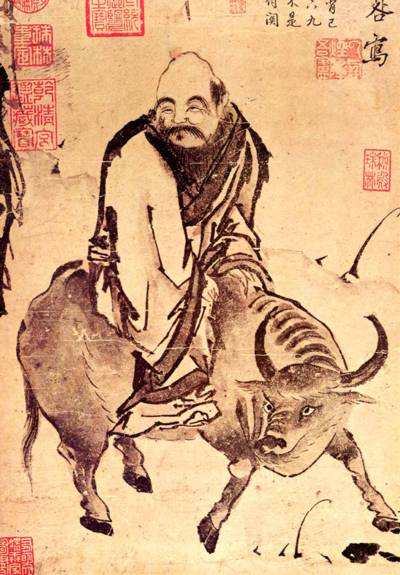
According to legend, Laozi rode a water buffalo when he left the Zhou Dynasty.
目次
老子は、古代中国の思想家であり、道家の祖とされています。
彼の教えは「道徳経」にまとめられ、現代でも多くの人々に読まれ続けています。
「道」は宇宙の根本原理であり、自然な流れに従うことが重要と説かれています。
老子の思想は、無為自然や柔弱勝剛といった概念を含み、現代のビジネスやライフスタイルにも応用されています。
特に、リーダーシップやストレス管理において、老子の教えは多くの示唆を与えています。
彼の哲学は、シンプルでありながら深い洞察を含んでおり、日々の生活においても大いに役立つものです。
Table of Contents
- Introduction to Laozi: Laozi is recognized as an ancient Chinese philosopher and the founder of Daoism.
- Teachings Compiled in the Dao De Jing: His teachings are collected in the “Dao De Jing,” a text still widely read today.
- The Principle of Dao: The “Dao” is the fundamental principle of the universe, emphasizing the importance of following the natural flow.
- Concepts of Laozi’s Philosophy: Laozi’s philosophy includes concepts such as Wu Wei (effortless action) and “Softness Overcoming Hardness,” applicable to modern business and lifestyle.
- Applications in Leadership and Stress Management: Laozi’s teachings offer valuable insights, especially in leadership and stress management.
- Simplicity and Deep Insights: His philosophy is simple yet profound, providing practical wisdom for daily life.
- Legend of Laozi’s Departure: According to legend, Laozi rode a water buffalo when he left the Zhou Dynasty.
老子の歴史とその背景
老子は、紀元前6世紀頃に活躍した中国の古代思想家であり、道教の開祖とされています。
彼の著作『道徳経』は、哲学的な「道」と「徳」の教えを中心に展開され、多くの人々に影響を与えました。
老子の思想は、無為自然を重視し、自然と調和した生き方を説いています。
彼の教えは、後の儒教や仏教とも深く関わり、その思想は東洋哲学の基盤となりました。
老子の生涯については、詳細な記録が少なく、伝説的な要素も多く含まれています。
彼の思想は、現代においても環境問題やストレス社会に対する解決策として注目されています。
史記に記録された老子
「史記」に記録された老子は、中国古代の思想家であり、道教の祖とされています。
司馬遷が著した「史記」には、老子の生涯や思想が詳述されています。
老子は「道徳経」という書物を著し、その中で「道」と「徳」の概念を説いています。
「道」は宇宙の根本原理を指し、「徳」はその原理に従う生き方を意味します。
老子の思想は、自然と調和した生き方を重視し、無為自然の哲学を提唱しました。
彼の教えは、後の中国哲学や文化に大きな影響を与えています。
特に、儒教との対比でその独自性が際立ちます。
老子の思想は、現代においても多くの人々に影響を与え続けています。
諸子百家による老子の記述
諸子百家の中で「老子」は特に重要な思想家として位置づけられています。
老子の思想は「道家」の中心であり、その記述は『道徳経』にまとめられています。
老子は自然との調和を重視し、「無為自然」を提唱しました。
この概念は、自然の流れに逆らわずに生きることを意味します。
諸子百家の他の思想家、例えば「孔子」や「孟子」とは異なり、老子は物質的な成功よりも精神的な充足を重視しました。
老子の教えは後に「荘子」によっても発展され、道家の思想は広がりました。
古代中国の政治や社会に大きな影響を与えた老子の思想は、現代でも多くの人々に影響を与え続けています。
老子に対する評価の多様性
老子は古代中国の哲学者であり、道教の祖とされています。
彼の思想は「道徳経」という書物にまとめられており、その内容は「無為自然」や「柔弱勝剛強」といった概念を含みます。
特に「無為自然」は、自然の流れに逆らわずに生きることを説いています。
老子の教えは、中国のみならず世界中で高く評価されていますが、その解釈は非常に多様です。
ある人々は彼の思想を「静かな革命」として捉え、他の人々は「内面的な平和」を追求する手段と見なしています。
また、老子の教えは現代のビジネスやリーダーシップにも応用されています。
特に、リーダーシップにおいては「控えめなリーダーシップ」が推奨され、部下の自主性を尊重するスタイルが注目されています。
このように、老子の評価は時代や文化を超えて多岐にわたります。
History and Background of Laozi
Laozi, an ancient Chinese philosopher who lived around the 6th century BCE, is regarded as the founder of Daoism.
His work, the “Dao De Jing,” revolves around the philosophical teachings of “Dao” and “De,” and has influenced countless people.
Laozi’s philosophy emphasizes “Wu Wei” (effortless action) and advocates living in harmony with nature.
His teachings deeply influenced later Confucianism and Buddhism, forming the foundation of Eastern philosophy.
Although detailed records of Laozi’s life are scarce and contain many legendary elements, his ideas are highly relevant today, offering solutions to environmental issues and stress in modern society.
Laozi as Recorded in the “Records of the Grand Historian”
In the “Records of the Grand Historian,” Laozi is depicted as an ancient Chinese philosopher and the founder of Daoism.
Sima Qian’s “Records of the Grand Historian” provide detailed accounts of Laozi’s life and philosophy.
Laozi authored the “Dao De Jing,” where he discusses the concepts of “Dao” (the fundamental principle of the universe) and “De” (living in accordance with this principle).
His philosophy prioritizes living in harmony with nature and promotes the idea of “Wu Wei.”
Laozi’s teachings have profoundly influenced subsequent Chinese philosophy and culture, standing out especially in contrast to Confucianism.
His ideas continue to impact many people in the modern world.
Laozi in the Writings of the Hundred Schools of Thought
Among the Hundred Schools of Thought, Laozi is particularly esteemed as a key philosopher.
His ideas form the core of Daoist philosophy and are compiled in the “Dao De Jing.”
Laozi emphasized harmony with nature and proposed the concept of “Wu Wei,” meaning to live without opposing the natural flow.
Unlike other philosophers such as Confucius and Mencius, Laozi valued spiritual fulfillment over material success.
His teachings were further developed by Zhuangzi, expanding Daoist thought.
Laozi’s philosophy significantly influenced ancient Chinese politics and society and continues to resonate with many people today.
Diverse Evaluations of Laozi
Laozi, an ancient Chinese philosopher and the founder of Daoism, compiled his ideas in the “Dao De Jing,” which includes concepts such as “Wu Wei” and “Softness Overcoming Hardness.”
“Wu Wei” emphasizes living in accordance with the natural flow.
Laozi’s teachings are highly regarded worldwide, though interpretations vary greatly.
Some view his philosophy as a “quiet revolution,” while others see it as a means to achieve “inner peace.”
Laozi’s teachings also find applications in modern business and leadership, promoting “humble leadership” that respects the autonomy of subordinates.
Thus, evaluations of Laozi’s philosophy span across different times and cultures.
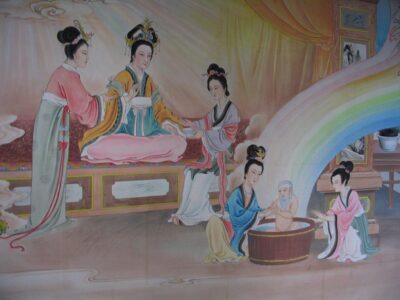
Depiction of Laozi’s Birth
老子に関する伝説と伝承
老子は、中国古代の思想家であり、道教の教祖とされています。
彼の存在には多くの「伝説」と「伝承」が絡み合っています。
老子の本名は李耳で、紀元前6世紀頃に生まれたとされますが、その生涯については謎が多いです。
特に有名な伝説として、老子が「西域」へ旅立つ際に関所で『道徳経』を書き残したという話があります。
この書物は、後に道教の基本経典となり、多くの人々に影響を与えました。
また、老子は「長寿」を象徴する存在ともされ、何百年も生きたという伝承もあります。
彼の思想は、自然と調和した生き方を重んじるもので、現代でも多くの人々に「哲学的」なインスピレーションを与え続けています。
老子の教えは、無為自然という概念を中心に据え、人間の欲望を抑え、自然の流れに従うことを説いています。
老子の生涯と伝説
老子は紀元前6世紀頃の中国の哲学者であり、道教の創始者とされています。
彼の本名は「李耳」と伝えられていますが、詳細な生涯は不明です。
老子は「道徳経」を著し、その教えは「道」と「徳」を中心に展開されます。
彼の思想は自然との調和を重視し、無為自然を説きました。
伝説によれば、老子は「西の関所」を越えて西方へと旅立ち、その後の消息は不明となっています。
これにより、老子の生涯には多くの神秘が残されました。
また、彼の弟子である「荘子」も老子の教えを受け継ぎ、道家思想を発展させました。
老子の影響は中国のみならず、日本や韓国などアジア全体に広がり、現代に至るまでその思想は多くの人々に影響を与え続けています。
字・伯陽とは
「字・伯陽」とは、中国古代の哲学者「老子」の本名である李耳(りじ)に付けられた字(あざな)です。
老子は『道徳経』の著者として知られ、道家思想の祖とされています。
彼の思想は、自然と調和し、無為自然の生き方を重視する点で特徴的です。
老子の教えは、現代においても多くの人々に影響を与え続けています。
特に「道(タオ)」の概念は、東洋哲学だけでなく、西洋思想にも深い影響を与えました。
彼の思想は、儒教と対比されることが多く、孔子との対話も有名です。
老子の思想を理解することは、中国古代思想を深く知る鍵となります。
尹喜との関連性
老子と尹喜の関連性は古代中国の歴史において重要な位置を占めています。
尹喜は「関令」として知られ、老子が西方に向かう際に出会った人物です。
伝説によれば、老子は尹喜に「道徳経」を口述したとされています。
尹喜はその教えを深く理解し、後に道家思想の発展に寄与しました。
老子の思想は「無為自然」や「道」を中心とし、尹喜はこれらの概念を広める役割を果たしました。
この二人の出会いは、道家思想の基盤を築く上で欠かせないものでした。
尹喜の存在がなければ、老子の教えが現在のように広く伝わることはなかったかもしれません。
Legends and Traditions of Laozi
Laozi, an ancient Chinese philosopher, is considered the founder of Daoism. His existence is intertwined with numerous legends and traditions.
Known as Li Er in real life, Laozi is believed to have been born around the 6th century BCE, though much of his life remains shrouded in mystery. One famous legend tells of Laozi writing the “Dao De Jing” at a border pass before departing for the West. This text later became a fundamental Daoist scripture, influencing countless individuals.
Laozi is also seen as a symbol of longevity, with some traditions claiming he lived for hundreds of years. His philosophy emphasizes living in harmony with nature, continuing to inspire many people with its profound insights.
Central to Laozi’s teachings is the concept of “Wu Wei” (effortless action), which advocates for curbing desires and following the natural flow.
The Life and Legends of Laozi
Laozi, a Chinese philosopher from around the 6th century BCE, is regarded as the founder of Daoism. His real name is believed to be Li Er, but detailed records of his life are scarce.
Laozi authored the “Dao De Jing,” focusing on the principles of “Dao” and “De.” His philosophy emphasizes harmony with nature and the concept of “Wu Wei.”
According to legend, Laozi traveled westward, disappearing after crossing a border pass, leaving a legacy shrouded in mystery. His disciple Zhuangzi further developed his teachings, spreading Daoist thought.
Laozi’s influence extends beyond China to Japan, Korea, and across Asia, continuing to impact many people today.
Zi: Boyang – Laozi’s Honorific Name
“Zi: Boyang” is the honorific name given to Laozi, whose real name was Li Er. Laozi is known for authoring the “Dao De Jing” and founding Daoist philosophy, which emphasizes living in harmony with nature and the principle of “Wu Wei.”
Laozi’s teachings continue to influence many people today. The concept of “Dao” has had a profound impact on both Eastern and Western thought. His philosophy is often contrasted with Confucianism, and his dialogues with Confucius are well-known.
Understanding Laozi’s ideas is key to grasping ancient Chinese philosophy.
The Connection Between Laozi and Yinxi
The relationship between Laozi and Yinxi holds significant importance in ancient Chinese history. Yinxi, known as the “Guardian of the Pass,” met Laozi as he was heading west. According to legend, Laozi dictated the “Dao De Jing” to Yinxi, who deeply understood his teachings and contributed to the development of Daoist philosophy.
Laozi’s philosophy centers on “Wu Wei” and the “Dao,” and Yinxi played a crucial role in disseminating these concepts. Their encounter was pivotal in establishing the foundation of Daoist thought. Without Yinxi, Laozi’s teachings might not have spread as widely as they did.
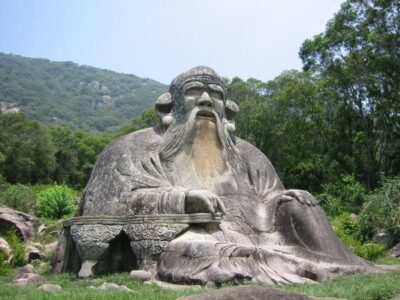
Statue of Laozi
『老子道徳経』に見る老子像
『老子道徳経』は、老子の思想を凝縮した古典であり、彼の哲学が色濃く反映されています。
老子は「無為自然」という概念を提唱し、人間が自然の流れに逆らわずに生きることを重視しました。
彼の教えは「道」と「徳」に基づいており、道は宇宙の根本原理を指し、徳はその道に従う生き方を意味します。
老子の思想は、現代のビジネスや自己啓発にも影響を与えており、その普遍性が高く評価されています。
また、老子は「柔弱勝剛強」という言葉で、柔軟な姿勢が最終的に勝利をもたらすと説いています。
彼の哲学は、競争社会においても調和を大切にする生き方を示唆しています。
『老子道徳経』における議論
『老子道徳経』は、古代中国の哲学者「老子」によって書かれたとされる重要なテキストです。
この経典は、道(タオ)と徳(デ)に関する深遠な教えを含んでおり、特に「無為自然」の概念が強調されています。
無為自然とは、自然の流れに逆らわず、無理をせずに生きることを意味します。
老子はまた、「柔弱勝剛強」という教えも説いており、柔らかく弱いものが強く硬いものに勝ると述べています。
これらの教えは、現代のストレス社会においても非常に有用であり、多くの人々にとって心の平安をもたらす指針となり得ます。
馬王堆・郭店の発掘書と老子
馬王堆と郭店の発掘書は、中国古代思想の重要な資料として注目されています。
特に「老子」の思想に関する記述が多く含まれており、研究者たちの間で貴重な情報源とされています。
馬王堆の発掘書は1973年に湖南省で発見され、郭店の発掘書は1993年に湖北省で見つかりました。
これらの書物は、戦国時代から前漢時代にかけての古代中国の思想や文化を理解するための鍵となっています。
「老子」の教えは、道教の基礎を形成し、後の中国哲学にも大きな影響を与えました。
発掘された書物には、現存する「道徳経」とは異なる部分もあり、これにより「老子」の思想がどのように伝承されてきたかが明らかになっています。
馬王堆と郭店の発掘書は、古代中国の「老子」研究において欠かせない資料です。
老子思想形成の背景
老子は中国古代の思想家であり、彼の思想は「道家思想」の基礎を築いた。
老子の生きた時代は「春秋戦国時代」であり、社会は混乱と戦乱が続いていた。
このような時代背景が老子の思想形成に大きな影響を与えた。
老子は「自然」と「無為自然」を重んじ、人間が自然の法則に従って生きることを説いた。
また、彼の思想は「道」と「徳」の概念を中心に展開され、これが後の「道教」にも影響を与えた。
老子の思想はその後の「荘子」や「韓非子」などの思想家にも受け継がれ、広く影響を及ぼした。
彼の著作『「道徳経」』は、今でも多くの人々に読まれ、深い洞察を提供している。
老子の「道」の解釈
老子の「道」は、古代中国の哲学書『道徳経』に記されています。
「道」は、宇宙の根本原理や自然の法則を指し、無為自然の生き方を説いています。
老子は「道」を理解し、実践することで、人々が調和の取れた生活を送ることができると考えました。
「道」は形や名前を持たず、無限の可能性を秘めています。
そのため、言葉で完全に説明することは難しいです。
老子の思想は、現代にも多くの影響を与え、東洋哲学や宗教、さらにはビジネスの分野でも注目されています。
「建言」から見る道の存在
「建言」から見る道の存在について考察すると、古代中国の哲学者「老子」が提唱した「道(タオ)」の概念が重要な役割を果たします
老子の教えは、自然の流れに逆らわず、無為自然を重んじることで知られています。
彼の著書『道徳経』には、政治や人生における「建言」が数多く記されています。
これらの「建言」は、道を理解し実践するための指針となります。
例えば、「道」は無理に何かを成し遂げようとせず、自然と調和することを強調します。
老子の思想は、現代社会においても多くの人々に影響を与え続けています。
彼の「建言」に耳を傾けることで、私たちもまた、より良い生き方や社会の在り方を見つける手助けとなるでしょう。
Laozi’s Image in the Dao De Jing
The “Dao De Jing” encapsulates Laozi’s philosophy, reflecting his profound ideas. Laozi advocated for the concept of “Wu Wei” (non-action), emphasizing living in harmony with the natural order. His teachings are based on “Dao” (the Way) and “De” (virtue), where Dao represents the fundamental principle of the universe, and De is the way of living in accordance with Dao.
Laozi’s thoughts influence modern business and self-improvement, demonstrating their timeless relevance. He also taught “softness overcoming hardness,” suggesting that flexibility leads to ultimate strength. His philosophy promotes harmony even in competitive environments.
Discussions in the Dao De Jing
The “Dao De Jing,” attributed to the ancient Chinese philosopher Laozi, is a vital text that delves into profound teachings on Dao (the Way) and De (virtue), particularly emphasizing the concept of “Wu Wei” (effortless action). Wu Wei signifies living in accordance with the natural flow, avoiding forced actions.
Laozi also introduced the idea of “softness overcoming hardness,” where the gentle and weak prevail over the strong and rigid. These teachings are valuable in today’s stressful society, providing guidance for achieving inner peace.
Laozi in the Mawangdui and Guodian Manuscripts
The Mawangdui and Guodian manuscripts are crucial sources for understanding ancient Chinese thought. These texts, discovered in Hunan Province in 1973 and Hubei Province in 1993, respectively, contain significant references to Laozi’s philosophy.
They offer insights into the evolution of Laozi’s ideas, revealing differences from the existing “Dao De Jing.” These manuscripts are essential for studying Laozi’s teachings, which laid the foundation for Daoism and profoundly influenced later Chinese philosophy.
The Formation of Laozi’s Thought
Laozi, an ancient Chinese thinker, laid the groundwork for Daoist philosophy. He lived during the tumultuous Spring and Autumn period, which shaped his ideas. Laozi emphasized “nature” and “Wu Wei,” advocating for living according to natural laws.
His philosophy centers on the concepts of “Dao” and “De,” influencing later Daoist teachings. Laozi’s thoughts were carried forward by philosophers like Zhuangzi and Han Feizi, extending his influence widely. His work, “Dao De Jing,” continues to offer profound insights to many.
Understanding Laozi’s Dao
Laozi’s concept of “Dao,” presented in the “Dao De Jing,” refers to the fundamental principle of the universe and the natural order. Laozi believed that by understanding and practicing Dao, people could lead harmonious lives.
Dao is formless and nameless, embodying infinite potential, making it challenging to fully describe in words. Laozi’s philosophy continues to influence modern thought, impacting Eastern philosophy, religion, and even business.
The Existence of Dao through Proposals
Exploring the existence of Dao through Laozi’s “proposals” highlights the importance of the concept he introduced. Laozi’s teachings are known for emphasizing harmony with nature and the principle of “Wu Wei.”
The “Dao De Jing” contains numerous proposals on politics and life, guiding the understanding and practice of Dao. Laozi’s ideas stress not forcing outcomes but aligning with natural harmony. His teachings continue to impact many in contemporary society, offering paths to better living and societal structures through his proposals.
老子の思想を理解する
老子は、中国古代の哲学者であり、「道家」の祖とされています。
彼の思想は『道徳経』にまとめられており、自然と調和する「無為自然」の理念が中心です。
「道」は全ての根源であり、無限の可能性を秘めた存在とされます。
老子は物事の「本質」を見極め、無理をせず自然の流れに従うことを説いています。
また、彼は「柔弱勝剛強」の考え方を提唱し、柔軟性や謙虚さが強さを凌駕すると主張しました。
老子の思想は、現代においても環境問題やストレス社会に対する解決策として注目されています。
彼の教えは東洋哲学の基礎を築き、多くの人々に影響を与え続けています。
老子の政治思想の起源
老子の政治思想の起源は「道」と「徳」に深く根ざしています。
老子は、自然の摂理に従う「無為自然」の理念を提唱し、これが政治においても重要としました。
彼の思想は、支配者が過度な介入を避け、民衆が自然な形で生活できる環境を整えることを重視しています。
老子の「道徳経」には、権力の乱用を戒め、謙虚さと柔軟性を持つことが理想のリーダーシップとされています。
また、老子は戦争や争いを避け、平和と調和を追求する姿勢を強調しました。
彼の思想は、後の中国の政治思想や東洋哲学に大きな影響を与え、現代でもその価値が再評価されています。
老子と社会階級の関係
老子の思想は、古代中国における「社会階級」に対する深い洞察を提供しています。
彼の教えは、自然と調和した生き方を重視し、社会の「階層」や「権力構造」に対する批判を含んでいます。
老子は『道徳経』で、「無為自然」という概念を提唱し、人々が自然の流れに従って生きることが最も理想的であると説きました。
これにより、社会的な「階級差」や「不平等」を超越することが可能になると考えられました。
老子の教えは、現代においても「社会正義」や「平等」に関する議論に影響を与え続けています。
彼の思想は、権力や富に囚われず、調和と平和を追求する生き方を示唆しています。
このように、老子の哲学は「社会階級」の問題を超越し、人間の本質的な幸福を追求する道を示しています。
Understanding Laozi’s Philosophy
Laozi, an ancient Chinese philosopher, is considered the founder of Daoism. His thoughts are encapsulated in the “Dao De Jing,” where he emphasizes the concept of “Wu Wei” (effortless action) in harmony with nature. “Dao” is seen as the source of everything, encompassing infinite potential. Laozi urged recognizing the “essence” of things and following the natural flow without force. He also introduced “softness overcoming hardness,” arguing that flexibility and humility surpass strength. Laozi’s ideas are still relevant today, offering solutions for environmental issues and the stresses of modern life. His teachings form the bedrock of Eastern philosophy and continue to influence many.
The Origins of Laozi’s Political Thought
Laozi’s political philosophy is deeply rooted in the concepts of “Dao” and “De.” He advocated for the principle of “Wu Wei” (effortless action), emphasizing its importance in governance. Laozi believed that rulers should avoid excessive intervention, allowing people to live naturally. In the “Dao De Jing,” he warned against the abuse of power and highlighted the importance of humility and flexibility for ideal leadership. Laozi also stressed the avoidance of war and the pursuit of peace and harmony. His ideas profoundly influenced Chinese political thought and Eastern philosophy, and their value is still recognized today.
Laozi and Social Class
Laozi’s philosophy offers profound insights into social class in ancient China. His teachings emphasize living in harmony with nature and critique societal hierarchies and power structures. In the “Dao De Jing,” he proposed the concept of “Wu Wei” (effortless action), advocating for a life aligned with natural flow as the ideal. This perspective suggests transcending social class differences and inequalities. Laozi’s ideas continue to influence discussions on social justice and equality today. He advocated for a way of life that values harmony and peace over power and wealth. Laozi’s philosophy transcends social class issues, pointing towards the pursuit of intrinsic human happiness.
道教における老子の位置付け
道教における「老子」の位置付けは非常に重要です。
老子は道教の創始者とされ、彼の教えは『道徳経』にまとめられています。
この書物は、道教の基本的な教義を形成し、自然と調和しながら生きることを説いています。
老子の思想は、無為自然や柔弱勝剛といった概念を重視し、これらの教えは道教の修行や儀式においても大きな影響を与えています。
特に、老子の教えは「陰陽」の調和を強調し、宇宙の根本原理としての「道」を理解することが求められます。
また、老子は「仙人」としても崇拝され、その神格化が進むことで道教内での老子の位置付けがさらに強固になりました。
彼の思想は、現代の道教徒にとっても依然として重要な指針となっています。
理想的な師弟関係
老子の教えは、理想的な師弟関係を築く上で非常に重要です。
老子は「道徳経」で、自然の流れに従うことの大切さを説いています。
師弟関係においても、無理に教え込むのではなく、弟子が自ら学び取ることを重視します。
これは、弟子が自分のペースで成長する環境を提供することに繋がります。
また、老子の教えには「柔軟性」が含まれています。
師が弟子に対して柔軟な姿勢を持つことで、弟子は安心して学ぶことができます。
さらに、老子は「謙虚さ」を強調しています。師が謙虚であることで、弟子も自然とその姿勢を学びます。
理想的な師弟関係は、互いの「信頼」と「尊重」に基づいて築かれます。
老子の教えを取り入れることで、より深い絆と理解が生まれるでしょう。
老子八十一化説の解説
老子八十一化説は、道教の経典である「道徳経」に基づく解釈の一つです。
この説は、老子が81回にわたって人々に教えを説き、その教えが人々の生活や精神に深い影響を与えたとされています。
「道徳経」は、老子が残した哲学的な教えを集めたもので、全81章から成り立っています。
各章は、人間の生き方や自然との調和についての洞察を提供します。
老子は「無為自然」を重視し、自然の流れに逆らわずに生きることの重要性を説きました。
八十一化説は、これらの教えがどのように具体的に人々の生活に適用されるかを示しています。
例えば、無為自然の考え方は、現代社会においてもストレスを軽減し、心の平穏を保つための指針となります。
老子の教えは、時代を超えて多くの人々に影響を与え続けています。
The Position of Laozi in Taoism
Laozi’s position in Taoism is highly significant. Regarded as the founder of Taoism, his teachings are encapsulated in the “Dao De Jing.” This text forms the fundamental doctrines of Taoism, advocating for living in harmony with nature. Laozi’s philosophy emphasizes concepts like Wu Wei (effortless action) and the superiority of flexibility over rigidity, influencing Taoist practices and rituals. Particularly, his teachings stress the harmony of Yin and Yang and understanding “Dao” as the fundamental principle of the universe. Furthermore, Laozi is revered as an “Immortal,” further solidifying his position within Taoism. His teachings remain essential guidance for modern Taoists.
The Ideal Teacher-Student Relationship
Laozi’s teachings hold significant importance in establishing an ideal teacher-student relationship. In the “Dao De Jing,” he emphasizes the importance of following the natural flow. Similarly, in the teacher-student relationship, Laozi advocates for allowing the disciple to learn at their own pace rather than forcing teachings upon them. This fosters an environment where the disciple can grow organically. Additionally, Laozi’s teachings include the value of flexibility. A teacher’s flexible approach allows the student to learn comfortably. Moreover, Laozi stresses humility, which, when adopted by the teacher, naturally influences the disciple. An ideal teacher-student relationship is built on mutual trust and respect, and incorporating Laozi’s teachings can deepen the bond and understanding between them.
Explaining Laozi’s Eighty-One Transformations Theory
Laozi’s Eighty-One Transformations Theory is an interpretation based on the Taoist scripture, the “Dao De Jing.” It suggests that Laozi imparted his teachings to people 81 times, profoundly impacting their lives and spirits. The “Dao De Jing” comprises 81 chapters, gathering Laozi’s philosophical teachings. Each chapter provides insights into human conduct and harmony with nature. Laozi emphasized Wu Wei, the importance of aligning with the natural flow of life. The Eighty-One Transformations Theory illustrates how these teachings can be practically applied in people’s lives. For instance, the concept of Wu Wei offers guidance for reducing stress and maintaining inner peace in modern society. Laozi’s teachings continue to influence people across generations.
参考文献の紹介
老子に関する参考文献の紹介です。老子は古代中国の哲学者であり、「道徳経」の著者として知られています。
まず、代表的な文献として「道教の教典」が挙げられます。
これは老子の思想を深く理解するための必読書です。
次に、「老子の哲学的背景」に関する研究書も重要です。
これにより、老子の思想がどのように形成されたかを知ることができます。
また、「老子と現代社会」の関連性を探る文献も多く存在します。
これらの文献を通じて、老子の思想が現代にどのように適用されているかを学べます。
さらに、「老子の影響を受けた文学作品」も参考になります。
これにより、老子の思想がどのように文学に反映されているかを理解できます。
以上の文献を活用し、老子の深遠な思想をより深く探求してください。
老子は、中国古代の哲学者であり、道教の祖とされる人物です。
彼の思想は「道(タオ)」を中心に展開され、その教えは『道徳経』にまとめられています。
この書物は、シンプルで深遠な言葉で書かれており、古代から現代に至るまで多くの人々に影響を与えてきました。
老子の教えは、自然との調和や無為自然を重視し、人間の欲望や執着を超越することを説いています。
読書ガイドとしては、まず『道徳経』を一読することをお勧めします。
次に、現代の解説書や注釈書を併読することで、老子の思想をより深く理解することができます。
老子の教えは、ビジネスや日常生活にも応用できるため、幅広い読者層に支持されています。
Introduction to Reference Materials
Here’s an introduction to reference materials about Laozi. Laozi was an ancient Chinese philosopher known as the author of the “Dao De Jing.”
First and foremost, the “Taoist Scriptures” stands out as a representative literature. It’s a must-read for gaining a deep understanding of Laozi’s philosophy.
Next, research books on the “Philosophical Background of Laozi” are equally crucial. They shed light on how Laozi’s philosophy was shaped.
Moreover, there are numerous works exploring the “Relevance of Laozi to Modern Society.” Through these, one can learn how Laozi’s philosophy is applied in contemporary times.
Additionally, examining “Literary Works Influenced by Laozi” can be insightful. It helps understand how Laozi’s philosophy is reflected in literature.
By utilizing these resources, delve deeper into the profound philosophy of Laozi.
Laozi, an ancient Chinese philosopher, is revered as the founder of Taoism.
His philosophy revolves around the concept of “Dao,” and his teachings are compiled in the “Dao De Jing.”
This text, written in simple yet profound language, has influenced many people from ancient to modern times.
Laozi’s teachings emphasize harmony with nature, the importance of Wu Wei (effortless action), and transcending human desires and attachments.
As a reading guide, it’s recommended to start by reading the “Dao De Jing.” Then, supplement it with contemporary commentaries and annotations to gain a deeper understanding of Laozi’s philosophy.
Laozi’s teachings are applicable to business and everyday life, making them popular among a wide range of readers.
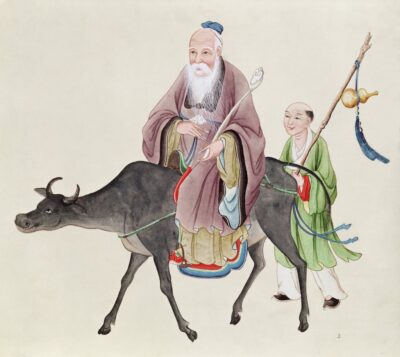
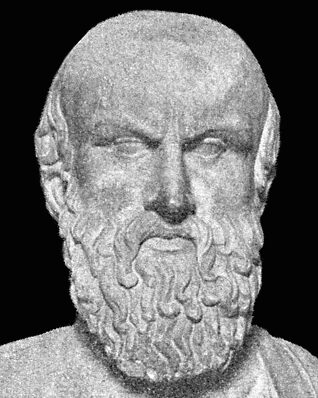
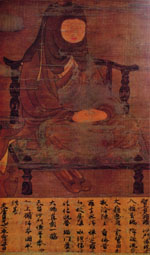
コメント